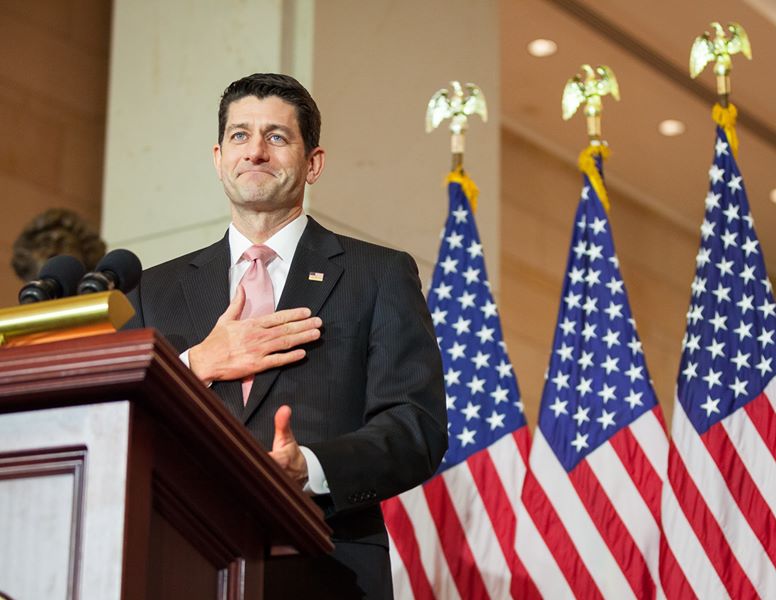Ryan Health Care Plan Misfires
Private companies left out of discussion, may be pushed to drop employee coverage.
In their rush to repeal and replace Obamacare, Paul Ryan’s Republicans in the House essentially punted.
They had seven years while vehemently opposing the Affordable Care Act (ACA), which played out as the unaffordable Care Act, to craft with an elegant plan for governing the health care industry – nearly one-fifth of the U.S. economy. Instead they made least-wurst sausage.
The Speaker Ryan (R-Wis) knows a lot about health care economics, so President Trump (not so much) has made him the head sausage maker. There are a lot of ingredients in his politically expedient House plan, none of them very bold.
They kept politically popular elements of the plan: coverage of young adults on parents’ plans and pre-existing conditions, both of which drive insurance costs up. They got rid of a politically unpopular element of ACA, the individual mandate, which will drive costs up as young health people leave the insurance pools.
They ducked the fiscal note on how much their plan is going to cost above or below ACA.
They substituted tax credits for the Obamacare subsidies, but they are kissing cousins of one another. The legitimate worry on the part of some House Republicans, including Rep. Glenn Grothman (R-Wis), is that the credits were set so high that private employers will dump their health plans and put their employers onto the insurance market for single policies.
It costs around $6,000 to provide care for an average American employed in the private sector. With the average tax credit set at about $3000, the temptation for employers to get out of the health will be high.
Time will tell how many employers actually bail on the health care benefit. But if they do bail in large numbers, it is not a good thing for the country, because the private payers are the real reformers who are bringing down health costs. Insurance companies are not reformers; they are middle men.
Note: rising health costs are the real elephant in the room (pun intended). They continue to inflate at double the general inflation rate in the country.
There is also a huge risk, because some 150 million Americans now get their health care through their employers’ plans. What if the private markets don’t work well, if health care insurers don’t step up?
Unfortunately, private companies, who pay every dollar for the nation’s healthcare bill, either through their own health plans or through taxes at the company or employee level, have not been major participants in the national discourse on health care. Most of political debate has been about insurance reform, but since private companies mostly self-insure, so they are not in the game of insurance policies any more.
What else will be lost if employers bail? Private employers have increasingly set up medical homes for their people. They have become very serious about proactive primary care that keeps their work forces healthy and out of expensive and dangerous hospitals. IBM, for example, requires medical homes in any health plan they contract for.
Private payers have learned that incentives and disincentives have to be right for every consumer of care. That means high deductibles and co-insurance, offset by some kind of savings plan. Health Savings Accounts, a Republican invention, work fine for people paying taxes, because they are triply tax-advantaged. But they don’t work well for roughly half of the population that doesn’t pay taxes. That uneven playing field needs to get fixed.
The Republicans have missed an opportunity to establish real transparency on the price of care. Prices vary 400% in the present busted business model. There is a silver bullet for Mr. Ryan. He could amend the bill to mandate that health plans offer bundled prices. That means one, fixed price for any standard procedure. Bingo: instant clarity. Anyone can understand $26,000 for a joint replacement or $3,000 for a colonoscopy. No one can understand today’s inscrutable medical bills.
Speaker Ryan and the GOP could have learned many lessons from private employers. He could still solve many more of the issues facing America healthcare with amendments. He and, by extension, President Trump, will not get much applause for booting a long punt.
John Torinus is the chairman of Serigraph Inc. and a former Milwaukee Sentinel business editor who blogs regularly at johntorinus.com.
Op-Ed
-
Wisconsin Candidates Decry Money in Politics, Plan to Raise Tons of It
 Dec 15th, 2025 by Ruth Conniff
Dec 15th, 2025 by Ruth Conniff
-
Trump Left Contraceptives to Rot; Women Pay the Price
 Dec 8th, 2025 by Dr. Shefaali Sharma
Dec 8th, 2025 by Dr. Shefaali Sharma
-
Why the Common Council’s Amended Budget is Good Policy for Milwaukee
 Nov 20th, 2025 by Alds. Marina Dimitrijevic and Russell W. Stamper, II
Nov 20th, 2025 by Alds. Marina Dimitrijevic and Russell W. Stamper, II






















Paul Ryan is a piece of shit. This exchange says it all.
Carlson: The overview here is that all the wealth [in] basically the last ten years basically has stuck to the top end, that’s one of the reasons we’ve had all this political turmoil, as you know. Kind of a hard sell to say, ‘Yeah, we’re gonna repeal Obamacare but we’re gonna send more money to the people who’ve already gotten the richest over the last ten years.’ I mean, that’s what this does, no? … I’m not leftist, that’s just, that’s true!
Ryan: I–I–I’m not concerned about it because we said we were gonna repeal all the Obamacare taxes, this is one of the Obamacare taxes. The other point I’d is, this dramatically helps tax reform.
So, asked about why his plan gives rich people a big tax cut, Ryan makes three points. The first is that he doesn’t care — “I’m not concerned about that” — is true, or a massive understatement. He’s not only not concerned, it is a major motivation. The third point, that it helps tax reform, is also true. As noted before, Ryan’s legislative strategy is designed around the goal of enabling a large, permanent tax cut for the rich. Obamacare repeal is being rushed in order to grease the skids for tax cuts later. But notice what Ryan is saying. Asked why his health-care plan (which massively cuts health care for the poor and middle class) includes a tax cut for the rich, Ryan explains that it will enable another tax cut for the rich later on! http://nymag.com/daily/intelligencer/2017/03/watch-paul-ryans-adams-apple-when-asked-about-the-rich.html
To repeal, or not to repeal? That is the question: Whether ’tis nobler in a bind to pitch the box and bake from scratch, or to embellish Betty Crocker, and by proposing blend them. – Hamonryanlet, Prince of Janesville
Are you sure TOrinus wrote this? Private employers bailed on ACA, by pulling employees hours under the mandate and dropping coverage. Offering health insurance has always been voluntary anyway.
Besides, Ryan has built amendability into the bill. Torinus’ concerns will be addressed in committees. Ryan is a fine golfer, for a noodler. He knows that when the green breaks sharply right, you don’t start the ball directly at the hole.
To repeal, or not to repeal? That is the question: Whether ’tis nobler in a bind to pitch the box and bake from scratch, or to embellish Betty Crocker, and by proposing blend them. – Hamonryanlet, Prince of Janesville
Are you sure Torinus wrote this? Seems a tad hasty. Employer dropped under ACA by dropping workers hor below the mandate and cutting coverage. Helath care has always been voluntary anyway.
Ryan has built amendability into his bill. All your concerns and more will be handled in committees on both ends of the Capitol. Ryan is a fine golfer, for a noodler. He knows that when the green banks sharply right, you don’t start the ball directly at the hole. AHCA will be the Cinderella story at Augusta.
“Employers dropped under ACA by —-DROPPING WORKERS HOURS—- below the mandate and cutting coverage.”
We hear this all of the time . Have any proof of this claim ? Or is this just another one of jay webers talking points/projections with no basis in fact.
(-It’s evident many of our commenters cannot spell or compose a sentence beyond the fourth grade level . Is that asking too much in the 21st century or do those little keys get in the way ?)